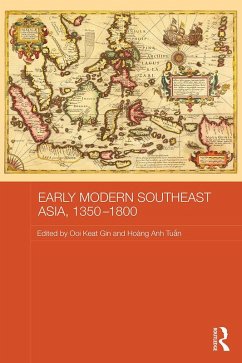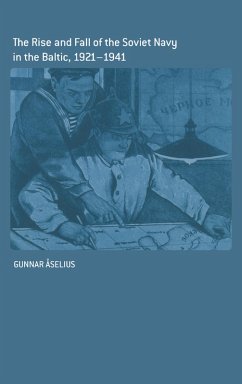
Mountbatten's Samurai: Imperial Japanese Army and Navy Forces under British Control in Southeast Asia, 1945-1948 (eBook, ePUB)

PAYBACK Punkte
0 °P sammeln!
Six weeks after Japan's surrender in August 1945, British and Japanese troops were fighting side-by-side against nationalist revolutionaries in 'peacekeeping' operations in Indonesia and Vietnam. In Java, Dutch civilians cheered as their former jailors, members of the infamous kenpeitai rescued them from what had seemed certain death at the hands of armed mobs. In November 1945 a Japanese Army officer was recommended for a British Distinguished Service Order (DSO) for services rendered to South-East Asia Command after his troops helped restore order and save thousands of civilian lives.'The Ja...
Six weeks after Japan's surrender in August 1945, British and Japanese troops were fighting side-by-side against nationalist revolutionaries in 'peacekeeping' operations in Indonesia and Vietnam. In Java, Dutch civilians cheered as their former jailors, members of the infamous kenpeitai rescued them from what had seemed certain death at the hands of armed mobs. In November 1945 a Japanese Army officer was recommended for a British Distinguished Service Order (DSO) for services rendered to South-East Asia Command after his troops helped restore order and save thousands of civilian lives.
'The Japanese may be so deployed and…drastic action including shooting should be taken against any who refuse'. Admiral Mountbatten (to War Office), Kandy, 24 August 1945.
'The men concerned are surely Japanese prisoners-of-war and if the War Office, in order to evade compliance with the Geneva Convention, have decided to call them something else, this should not…avoid responsibility for decent treatment.' Foreign Office, London, 18 March 1946.
In August 1945 Britain accepted responsibility for the care and repatriation of over 750,000 Japanese military personnel in Southeast Asia. Short of manpower and resources in Burma and Malaya, and with its French and Dutch Allies' colonial territories of Indo-China (FIC) and the Netherlands East Indies (NEI) embroiled in revolution, Britain found it expedient to press the Japanese-who were denied Prisoner of War (PoW) status-into military operations in support of European colonial interests and then ignore repatriation commitments by deliberately retaining over 100,000 as mass, unpaid labour.
'[A] stain which would blemish the honor of the United Kingdom…' General Douglas MacArthur, Tokyo, March 1947.
Mountbatten's Samurai reveals a Britain struggling to match Great Power status and obligation without a Great Power budget or capability in Southeast Asia in the face of strong criticism from the US State Department in Washington, General Douglas MacArthur's SCAP GHQ Occupation headquarters in Tokyo, the International Committee for the Red Cross (ICRC), the Japanese Government and even the Vatican.
'A perceptive, detailed and shrewd analysis of the prolonged and secret diplomatic stand-off between London and Washington over Britain's post-war use of tens of thousands of surrendered Japanese in combat operations in support of European colonial interests in contravention of the Geneva Convention, and later as deliberately retained, unpaid labour in breach of the Potsdam Agreement'. (Publisher's Catalogue)
'The Japanese may be so deployed and…drastic action including shooting should be taken against any who refuse'. Admiral Mountbatten (to War Office), Kandy, 24 August 1945.
'The men concerned are surely Japanese prisoners-of-war and if the War Office, in order to evade compliance with the Geneva Convention, have decided to call them something else, this should not…avoid responsibility for decent treatment.' Foreign Office, London, 18 March 1946.
In August 1945 Britain accepted responsibility for the care and repatriation of over 750,000 Japanese military personnel in Southeast Asia. Short of manpower and resources in Burma and Malaya, and with its French and Dutch Allies' colonial territories of Indo-China (FIC) and the Netherlands East Indies (NEI) embroiled in revolution, Britain found it expedient to press the Japanese-who were denied Prisoner of War (PoW) status-into military operations in support of European colonial interests and then ignore repatriation commitments by deliberately retaining over 100,000 as mass, unpaid labour.
'[A] stain which would blemish the honor of the United Kingdom…' General Douglas MacArthur, Tokyo, March 1947.
Mountbatten's Samurai reveals a Britain struggling to match Great Power status and obligation without a Great Power budget or capability in Southeast Asia in the face of strong criticism from the US State Department in Washington, General Douglas MacArthur's SCAP GHQ Occupation headquarters in Tokyo, the International Committee for the Red Cross (ICRC), the Japanese Government and even the Vatican.
'A perceptive, detailed and shrewd analysis of the prolonged and secret diplomatic stand-off between London and Washington over Britain's post-war use of tens of thousands of surrendered Japanese in combat operations in support of European colonial interests in contravention of the Geneva Convention, and later as deliberately retained, unpaid labour in breach of the Potsdam Agreement'. (Publisher's Catalogue)
Dieser Download kann aus rechtlichen Gründen nur mit Rechnungsadresse in A, B, CY, CZ, D, DK, EW, E, FIN, F, GR, H, IRL, I, LT, L, LR, M, NL, PL, P, R, S, SLO, SK ausgeliefert werden.













